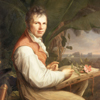This Month's Free Articles
- André Gide
- Edna O'Brien
- Giovanni Boccaccio
- Richard Flanagan
- Sylvia Plath
- El laberinto de la soledad [The Labyrinth of Solitude] (Octavio Paz)
- I Am Malala: The Girl Who Stood Up for Education and Was Shot by the Taliban (Malala Yousafzai)
- Orientalism (Edward Said)
- The Unfortunate Lover (Andrew Marvell)
- To the Lighthouse (Virginia Woolf)
Featured Articles

1968
Part of our contextual historical section, the article examines the protests of 1968, highlighting their role as a culmination of societal changes initiated during World War II and a challenge to Cold War ideologies. It discusses the shifting dynamics of protest, focusing on key movements in Italy, West Germany, France, Czechoslovakia, and the United States. Each section illustrates how local grievances reflected broader ideological struggles, including demands for democratization, personal freedoms, and identity politics, concluding that, while the protests represented a significant cultural moment, they often fell short of achieving their radical aspirations. The article is comprehensive and nuanced, effectively weaving together various historical contexts and movements while analyzing the interconnectedness of global protests. It showcases a sophisticated understanding of the ideological and cultural shifts of 1968, illuminating the complexities within each country's struggle for change.

American Detective Fiction
The article traces the evolution of modern detective fiction, highlighting the shift from British eccentric sleuths to American tough protagonists. It is capacious and comprehensive in its reach, discussing a wide array of American detective fiction, from on the emergence of the “tough guy” archetype, represented by Dashiell Hammett's Sam Spade and Raymond Chandler’s Philip Marlowe to the rise of complex female detectives, with contributions from writers like Sue Grafton and Sara Paretsky. It showcases sophisticated analysis by comparing British and American styles, exploring themes of character development, societal influences, and gender dynamics, and offering a nuanced understanding of the genre’s progression from its emergence to the present day.

Icelandic Wonder Tale (Ævintýri)
The article offers a comprehensive analysis of an important component of Icelandic cultural heritage, referring specifically to wonder tales or fairy tales rather than adventures in general. It traces the historical origins and evolution of these narratives from medieval prose to contemporary collections. Key themes include the documentation of wonder tales by figures like Árni Magnússon and Jón Árnason, the significance of themes such as stepmothers in folklore, and the adaptation of these tales within Icelandic culture. Overall, it highlights the intricate relationship between oral traditions and written narratives in shaping Icelandic storytelling, providing detailed historical context and analysis while effectively linking folklore to broader literary developments.

Review of Alexander von Humboldt: Perceiving the World, West Lafayette, Indiana: Purdue University Press, 2023
The first review article published by The Literary Encyclopedia, it offers a brilliant insight into a fascinating new collection on the work of Alexander von Humboldt, the ur-scientist, written by one of the leading experts in his life and work. Together with the biographical entry on Humboldt, and the recommended readings associated to it, the LE thus offers a solid introduction into the work of this quintessential Enlightenment figure and the manifold aspects of his rich and diverse intellectual heritage.

The Renaissance in Literature
The article examines the transition from the Middle Ages to the Renaissance, emphasizing its complexity and gradual nature. It discusses key themes such as the impact of Francesco Petrarch as a humanist and poetic innovator, the shift from Latin to vernacular literature, the evolution of epic poetry, and the significance of drama, particularly through the works of Shakespeare and Marlowe. It concludes that this period marks a profound transformation in the individual’s relationship with society and traditional beliefs, spurred by a resurgence of creativity and exploration. The article is comprehensive and sophisticated, skilfully addressing the interplay between historical context and literary evolution while showcasing the influential figures of the period and their contributions.


